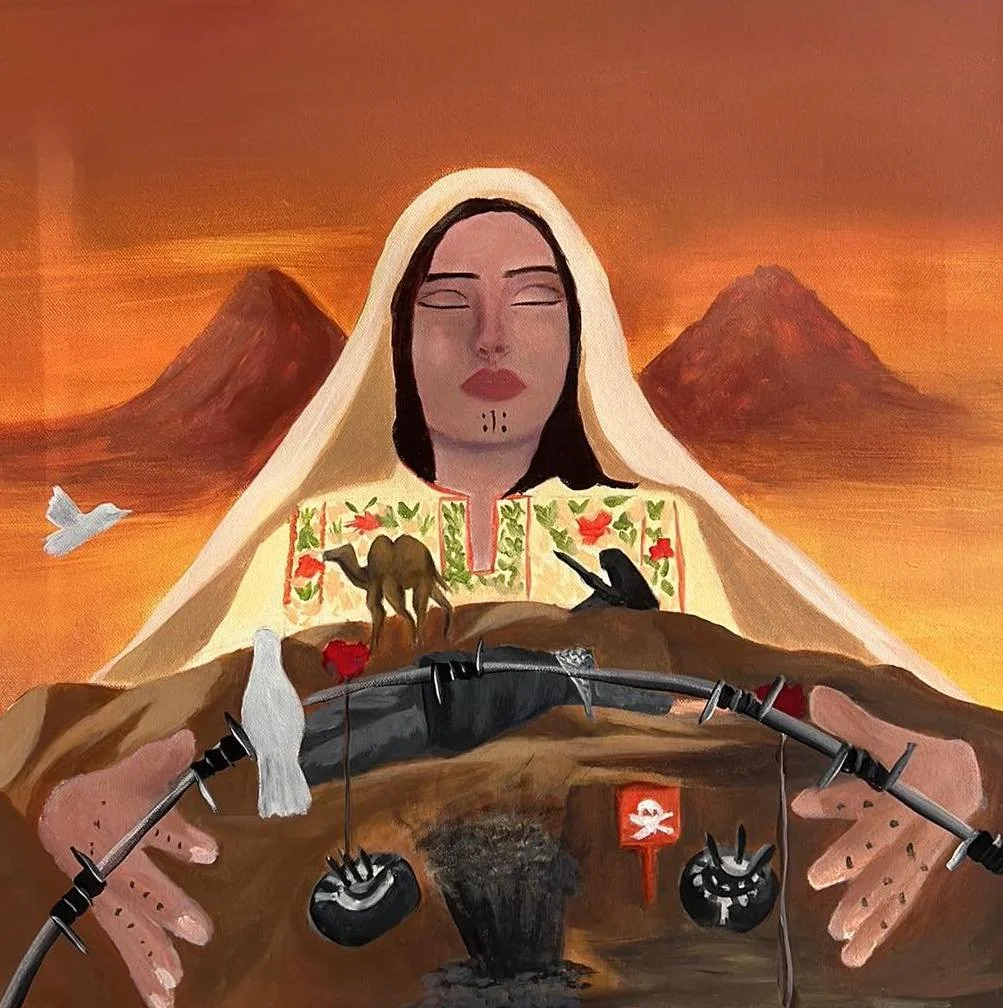Fadwa Tuqan - Eghbal Asadi
Fadwa Tuqan
Hamza (excerpt)
'My sister, our land has a throbbing heart,
it doesn't cease to beat, and it endures
the unendurable. It keeps the secrets
of hills and wombs. This land sprouting
with spikes and palms is also the land
that gives birth to a freedom-fighter.
This land, my sister, is a woman.'
Taken from 'This Land, My sister, is a Woman': Fadwa Tuqan's Legacy as a Feminist Icon' by Muna H. Khalidi, published in Palestinian Studies, September 20, 2022.
Tuqan, known as the “Poetess of Palestine,” is considered one of the most prominent cultural figures of Palestine. Between 1952 and 2000, she published eight collections of poetry. Selections of her poetry have been translated into English, French, German, Italian, Persian, and Hebrew. She was awarded a number of prizes and medals, including the annual Sulayman Arar poetry prize; the prize of the Union of Jordanian Writers in 1983; the Sultan Uways prize of the United Arab Emirates in 1989; the Jerusalem medal of the PLO in 1990; the prize of the World Festival of Contemporary Writing, Salerno, Italy, in 1992; the Tunisian cultural medal of 1996; and the PLO prize for literature in 1997. Several books and university theses have appeared about her and her work in a number of Arab and foreign universities, in addition to many articles and studies in Arab and foreign journals. The Palestinian novelist Liana Badr produced a documentary film about her life and poetry entitled “Fadwa: A Poetess from Palestine.”
Fadwa Tuqan died on 12 December 2003. She was almost 85 years old.
Bio taken from Palquest
Eghbal Asadi
Guardian Soil: Defiance in the Face of Displacement, 2023, Acrylic on canvas
Image description: Against a light filled orange and brown desert with pyramid-like hills, a woman with a light brown face and torso stands strong. The woman is wearing a pale head scarf and her clothing has a motif of red flowers and green leaves. Her large strong hands gather to her a brown camel, a heart, a woman painting and a Keffiyeh. In the foreground is a thick strand of barbed wire with a white bird sitting on it, a bomb, a red skull and crossbones sign, and an explosion sit beneath the wire.
I'm glad to present myself as an Iranian refugee or asylum seeker of Arabic origin and culture. My name is Eghbal, and I'm a self-taught artist.
I lived in Syria for four years – war is the worst thing that humans have ever created. Displaced, the only things that could fit in my small bag were a pen and a brush. I used the pen to draw the destination and the brush to colour the black and white picture that was in front of me. I started drawing and painting when there was no electricity, in the darkness of fire and under the candles light.
When I first arrived on Christmas Island, I found another candle, but it wasn't there due to the darkness. I wanted to see how the candle would melt and get smaller as each day went by in the detention, but I burned my fingers.
I participated in a Darwin exhibition. I was a proud woman who took part in Melbourne art shows as well. I'm married now and I've two angels. Yes, I do have more than 10 fingers and enough hands to do a significant work of art. As a result of my angels holding my hands and causing my burned fingers to heal, I am now a graphic designer and artist.
I was once a young woman, and now I'm a strong woman raising two other strong individuals, a strong woman and a strong man I'm content, joyful, and proud.
